READER COMMENTS ON
"Someone Else 'Gets It', When It Comes to the Need for Transparent, Hand-Counted Elections"
(12 Responses so far...)
COMMENT #1 [Permalink]
...
carver
said on 9/9/2012 @ 1:04 pm PT...
I believe computer technology is appropriate when it speeds up a process. results in greater accuracy, and saves money. Our current electronic voting chaos does none of that. Hand marked and counted ballots are much less expensive, far more accurate and no slower than the electronic process and as a bonus are immune to rigged election results.
COMMENT #2 [Permalink]
...
lets be reasonable
said on 9/9/2012 @ 2:04 pm PT...
Hand-counted paper ballots allow vote selling and coercion of voters since it is simple for voters to fill the form in a way that makes it easy to recognize without writing in the margins (e.g. special write-in names, patterns of down-ballot contests, even partial filling of ovals in optical scan). The voter worries that the vote buyer or coercer will be able to see the ballots and thus know how that voter voted --- or know that the voter is not cooperating with the scheme because the special "tell" is not present on any ballot.
Hand counted paper ballots do not provide assurance to voters who vote in one polling place about the totals in another polling place. This is a real problem, such as when some neighborhoods skew far in one direction. Intimidation of voters who might wish to oversee counts is a related issue.
Better ways to cast votes, that don't have these problems and that are less expensive in terms of overall cost are known and used. It is not only dishonest to promote hand-counted ballots as a panacea --- but it harms the cause of election integrity and is an insult to the intelligence of readers and to the good efforts of those actually working to improve election integrity!
COMMENT #3 [Permalink]
...
Brad Friedman
said on 9/9/2012 @ 10:05 pm PT...
"Lets Be Reasonable" @ 2:
Yes, I remember you posting the same nonsense, under a different name, some time ago. In case you have trouble with rules, let me remind you that we don't have a lot of them around here. But picking one name and sticking with it is one of 'em. Here are the few rules for commenting at The BRAD BLOG. Please respect them. Thanks.
As to the rest of your hooey....
Hand-counted paper ballots allow vote selling and coercion...
So, I guess you are against absentee voting in all cases, since that is a FAR easier way to accomplish what you are suggesting. To succeed at what you're talking about, you'd have to someone not only "selling and coerc[ing]", but ensure that the vote counters are also in on the scam, and taking enough time to check ballots for special patterns, rather than counting votes, even while there are 3 other counters/recorders participating and any number of judges and political party representatives looking over there shoulder.
In short, vote selling and coercion would be incredibly difficult the way you describe and FAR easier the way it could already be done via absentee voting (which is just one of the reasons I don't like Vote-by-Mail except for instances where a voter really will be absent on Election Day.)
Moreover, I guess you prefer one insider who can flip the results of an entire direction over the incredibly far-fetched notion that someone would try to sell/coerce via hand-counting. So, what e-voting company do you work for and/or advocate for? (And would you like to let everyone know who you are, or shall I do that for you?)
Hand counted paper ballots do not provide assurance to voters who vote in one polling place about the totals in another polling place.
Actually, all other methods of tallying ballots provide zero assurance of anything. Ever. If results are posted at each precinct, they are all available to all. So, yes, it assurance that all precincts ballots are counted transparently in a way that is almost impossible to game without being easily discovered.
Better ways to cast votes, that don't have these problems and that are less expensive in terms of overall cost are known and used.
Really? What are they. You failed to mention that. As usual.
It is not only dishonest to promote hand-counted ballots as a panacea --- but it harms the cause of election integrity and is an insult to the intelligence of readers and to the good efforts of those actually working to improve election integrity!
Speaking of being dishonest, that graf is among the most dishonest you have ever written. And, that's saying quite a lot about you!
But feel free to be honest about who you are and what you are advocating. But don't break our rules here or you won't be back at all. Thanks!
COMMENT #4 [Permalink]
...
GWN
said on 9/10/2012 @ 12:17 am PT...
The Quebec people are passionate and very involved in politics.(There was a big fuss when the anti-smoking laws came in) Unfortunately with the Parti Quebecois manority win we will be dealing with the sovereignty issue again.
But...not here about that.
I owe Brad an apology for not getting his snark remark (shitty speakers -Set 4) about the President Obama and Clinton. I reacted too quickly (didn't follow my wait 12 hours rule when annoyed) and should have known after following the site for seven years Brad is always neutral and it one of the reasons this site is my main read everyday. I use his work often with our MP's and MPP's and others who are not "aware" yet of the dangers of internet voting.
With much respect...GWN
COMMENT #5 [Permalink]
...
jo
said on 9/10/2012 @ 12:27 am PT...
I agree with you Brad, I would also like to see the popular vote win instead. The republican platform says they do not want anything changed, except voter ID, and other suppression's. They also blame and bad mouth President Obama every other paragraph too. If you can manage to get through the thing it will make you cry at all they want to do to most Americans and nature. How sad it's bad enough that they are all willing to lie to an extreme and double down on them. Now every single one of them don't mind if they also must steal the election to get into power. None of them have any morals whatsoever. We need two parties, but the GOP needs to be replaced, they are beyond hope. Name anything wrong or bad in America and 99% of it you can thank a republican for.
COMMENT #6 [Permalink]
...
GWN
said on 9/10/2012 @ 1:41 am PT...
Editing #4 "minority" not MANority.
COMMENT #7 [Permalink]
...
David Jefferson
said on 9/10/2012 @ 10:54 am PT...
Brad, I understand the attraction of all hand-counted paper ballots. But it seems to me you can get the benefits without the disadvantages by using a hybrid strategy of paper ballots that are both counted by machine yet also subject to a an open, hand-counted, risk-limiting audit process in which a sufficiently large random sample of the paper ballots are counted by hand to verify that the machine counts call the election properly. There is a strong statistical theory of how many ballots have to be sampled in order to be effectively certain that the outcome is called correctly by the machines, and fortunately is is usually (not always) far fewer than a full recount. Generally, the close the election is, the more ballots have to be sampled, and in the extreme but very rare case of an election where there is a one-vote difference, the sample has to be 100%, which is the same as requiring a full hand count.
I don't know if you are following the literature and experiments on risk limiting audits, but if not I suggest that you might actually find this process satisfactory. I do.
COMMENT #8 [Permalink]
...
Casey Reed
said on 9/10/2012 @ 11:14 am PT...
Hand count paper ballots in the polls on election day with witnesses from parties on the ballot present, video record the counting (one person calls out the vote and another writes) in view of the camera, so all voters could review the video from each precinct. Tally all hand counts from each precinict by hand at the county level and county totals by hand at the state level. Then tally states by hand at the national level.
The German Supreme Court found that using software is a violation of the Constitution because software or computers disenfranchise the voter from the process. You can't witness what black boxes do or software working.
COMMENT #9 [Permalink]
...
Brad Friedman
said on 9/10/2012 @ 11:39 am PT...
David Jefferson @ 7:
While you know I have great respect for your opinions on such matters, I find the call for an "open, hand-counted, risk-limiting audit process in which a sufficiently large random sample of the paper ballots are counted by hand to verify that the machine counts call the election properly" to be an unsatisfactory solution to the problem.
There are a number of reasons I find such "audits" (really, they are "spot-checks") to be problematic and far less than democratic self-governance demands. Among them:
+ After the race has already been "called" on election night, it's very difficult to see those results changed, and the candidate named the "winner" on election night has an unfair advantage in post election processes (as I'm sure you've noted in previous post-election battles.)
+ The math for determining the appropriate number of ballots to be "audited" is very complicated and, for most, requires the need to "trust" in others to get that number right. As you know, I don't like election procedures that require anybody to simply "trust" in anybody else. Moreover, the complicated math, and the need for random-ness in which ballots are spot-checked allows for still more opportunities to game the system. (See the gamed post-election tally in Cuyahoga County, OH in 2004.)
+ The math used to determine the number of ballots to be counted in the post-election spot-check is also determined by the computer-reported Election Night results. Game the computer results, and you also have the ability to game the possibilities of any fraud being detected during the post-election spot-check.
+ Such spot-checks take place after ballots have already been transported from precinct to headquarters and, thus, after they have been removed from the visible chain of custody. That opens another vector for ballots to be gamed between computer-reported results and the post-election spot-checks.
+ Finally, for now, while post-election spot-checks are better than no post-election spot-checks (in lieu of Election Night, precinct-based hand-counting), it's another half measure to compensate for what's really needed, and the one thing that really offers assurance to the citizenry that their vote has been tabulated correctly. If precinct-based hand-counting was all that impossible --- and, perhaps it is, but I'm not convinced of that by a long shot --- post-election spot-checks might suffice to offer some "best that we can offer" assurance. But, until convinced otherwise, I see no reason to believe that they are the best that we can offer, nor are they nearly as much as we all deserve and need in order to protect true self-governance and the confidence in election results that is required for that.
COMMENT #10 [Permalink]
...
David Jefferson
said on 9/10/2012 @ 2:05 pm PT...
Brad, I agree with some of your comments, but not all.
First, I have to object to your attempt to substitute the term "spot check" for "risk limiting audit". The term "spot check" diminishes the process, suggesting that it is informal, haphazard, or subject to the whims of whoever is administering it. But statistical sampling theory is a foundational to all industrial quality control processes as well as audit processes,, including financial audits, and is able to be precisely calibrated to whatever high level of confidence you want that the preliminary outcome of an election is correct (or not). It is important that the auditing process be routine for every election. It is not supposed to optional, and does not require any candidates or voters to request it, or pay for it.
+ Yes, the audit process happens after the preliminary machine results have been released. but the race has not officially been "called" at that point, as you know. In a close race it is difficult to overturn the preliminary results precisely because the results are close. But the same court battles and public teeth gnashing will happen in a very close race that was hand counted as well. There will be just as much fighting over which voters may have been ineligible or were disenfranchised, and which ballots should be counted, regardless of whether the preliminary results were hand counted or machine counted. And as I said, in a very close race the auditing process reduces to a full hand count anyway. The process is really very elegant.
+ The full mathematical theory of (near optimal) post election auditing is indeed complex, and voters cannot be expected to understand it fully. Fortunately, there are much simpler formulations that are much easier to understand, but are approximations that therefore require somewhat larger samples to give the same degree of confidence in the result. Most people won't understand these either, but they are at least open, and the formulae can be published and scrutinized in advance by anyone with the proper background, including representatives of all parties and other stakeholders. So you don't have to trust me --- you only have to trust your party's statistician. Of course since the mathematics is open, anyone is free to follow the audit and check with his own implementation whether the sample sizes and confidence values are consistent. Please note that such formulae are used in all kinds of industrial quality control and financial auditing processes. And there are plenty of people out there who do political statistical work (analyzing polls, for example) who can understand and validate the relevant mathematics.
+ Yes, the auditing takes place after the ballots are transported from the precinct to the county election offices. But the two person rule is a check against tampering with ballots in transit. But the same is true of "hand counted paper ballots" unless you are advocating hand counting at the polls (which I think would be a nightmare for complex ballots). That kind of fraud during ballt transport is retail anyway, and I know of no cases of it in the U.S. in the last half century. If it should become a problem, however, I suggest that increasing the two person rule to require more people to be physically present with ballots at all times will suffice.
+ I do not see post election auditing as a "half measure". It can be 99% measure or, with a larger sample size, a 99.99% measure. Choose the level of confidence you want and the formulae will tell you the sample size you need. If you want 100% confidence, the formulae may tell you that you need as much as 100% sample size, i.e. a full hand count in the worst case, although the vast majority of the time much less will suffice.
COMMENT #11 [Permalink]
...
Casey Reed
said on 9/10/2012 @ 6:53 pm PT...
Audits are the placation to the guilty, who too late, want to feel secure or check what happened.
The chain of custody is the key to voter and citizen involvement. If the citizens can not be part of the process when they cast a vote, then who voted? If a citizen can not witness the counting from cast to count and know the totals have been witnessed or recorded for anyone to witness, then the process is not open, transparent, or removes the voter from the process.
You can not remove citizens from the election of their government and then say the government represents the people.
No hybrid system using software, audits that are after the fact, and "trust US election methods" that can not be witnessed are transparent, open, or accountable.
No accountability/witness-ability, No democracy.
COMMENT #12 [Permalink]
...
Brad Friedman
said on 9/10/2012 @ 8:38 pm PT...
My friend David Jefferson said @ 10:
I have to object to your attempt to substitute the term "spot check" for "risk limiting audit". The term "spot check" diminishes the process, suggesting that it is informal, haphazard, or subject to the whims of whoever is administering it.
While I don't mean to diminish the process as informal or haphazard with that phrase, I do mean to more accurately describe the process. While it may be, if done right (and it rarely, if ever, is), "routine for every election" with "industrial quality control processes", it is not, by any stretch of the imagination an "audit", anymore than checking the amount of cash in each drawer of X number of bank tellers at the end of each day would be an "audit".
The "audits" you describe really are spot-checks. They do not, for example, (to my understanding) audit against the number of voted, unvoted and spoiled ballots at each precinct, or include reconciliation with poll books, etc. They amount to a simple hand count of the votes on X number of ballots, from a supposedly random sample of precincts, for a particular race and check that tally against the election night results tapes. Period. There is not a fully audit of the tabulation process, but rather a simple spot-check, albeit to a particular pre-defined formula to determine the number of ballots to be counted (as based on the closeness of the computer-reported results.)
If there is something you feel I am misunderstanding about the process, of course, please let me know. But I think describing them as "audits" is as accurate as mis-describing "Voter-verifiable Paper Audit Trails" on touch-screen machines as "Voter-verified Paper Audit Trails" or even as "Paper Ballots" as so many people do.
Moreover, I would add that the process also, generally, fails to include remedies when problems are discovered. We have a form of post-election audits in California, as you know, but they are quite general in their determinative formula (X percentage of ballots are to be counted in races where the margin between the top two candidates is Y.) But there is little or nothing in the statutes, to my knowledge, that speaks to what happens when differences are discovered between the "audit" and the computer results. I've heard of cases in L.A. where the "audit" discovered the initial count was off by a mile. Yet, nothing happens, other than officials say "Okay, the original count was off by X votes. End of statutorily required 'audit'! Let's certify this sucker and be done with it!"
Yes, the audit process happens after the preliminary machine results have been released. but the race has not officially been "called" at that point, as you know.
Correct. Neither was it officially "called" for George W. Bush, as the most famous example, in 2000. Yet, he was able to argue, successfully, at the U.S. Supreme Court that he would be "irreparably harmed" if a count of ballots was allowed to proceed in FL, since he had already been named the "winner" by the media on election night. As well, I'm sure you've noticed that whoever happens to be called the "winner" on election night, no matter that it is "unofficial", enjoys any number of advantages in post-election "recounts" and contests.
In a close race it is difficult to overturn the preliminary results precisely because the results are close.
Correct. Underscoring the need to "Get it Right on Election Night!" Which can only be done, as per my years of observation, by publicly hand-counting hand-marked ballots at the precinct on Election Night. Is that perfect? Nothing is. But I have been able to find nothing 'perfecter', nor difficult to game without a high probability of detection, to date.
But the same court battles and public teeth gnashing will happen in a very close race that was hand counted as well. There will be just as much fighting over which voters may have been ineligible or were disenfranchised, and which ballots should be counted, regardless of whether the preliminary results were hand counted or machine counted.
True, no doubt. But at least the candidate that goes into that process believed to be the "winner" (as unofficially called on Election Night) will have a valid reason to believe he/she likely received the most cast ballots. There is not necessarily any reason to believe that given computer-tallied results and post-election spot-checks later in the process.
And as I said, in a very close race the auditing process reduces to a full hand count anyway.
Right, but after the secure chain of custody has been brought into question during the transport of ballots from precinct to headquarters, and the subsequent storage of those ballots --- where anything can happen --- for X number of days until the post-election spot-check takes place.
Most people won't understand these [mathematical formulas for determining the number of ballots to count in a post-election "audit"] either, but they are at least open, and the formulae can be published and scrutinized in advance by anyone with the proper background, including representatives of all parties and other stakeholders. So you don't have to trust me --- you only have to trust your party's statistician.
Well, that won't work. I don't have a party. So who do I have to trust? Even if I did, I don't find it acceptable to have to trust anyone. This is (one of the reasons) why open source systems, or disclosed source to "accepted" individuals also does not pass muster with me. If my 87-year old grandmother can't understand the system under which she is forced to participate in her democracy, it's not good enough for me either.
Please note that such formulae are used in all kinds of industrial quality control and financial auditing processes.
But, David, as you know, you yourself have often argued very eloquently --- when, for example, someone suggests that "we can do our banking by computers or by the Internet, so why not voting?" --- that elections are not like financial processes. They are very very different, on any number of levels. Claiming that complicated auditing processes are good enough for financial auditing, so should be good enough for democracy undermines the very arguments you, yourself, have so eloquently made elsewhere in the past.
Democracy is different and requires a completely different set of values, processes and transparencies.
And there are plenty of people out there who do political statistical work (analyzing polls, for example) who can understand and validate the relevant mathematics.
Yeah, I know. I don't trust them either. Sorry.
Yes, the auditing takes place after the ballots are transported from the precinct to the county election offices. But the two person rule is a check against tampering with ballots in transit. But the same is true of "hand counted paper ballots" unless you are advocating hand counting at the polls
I am.
(which I think would be a nightmare for complex ballots).
Yes, I hear that a lot. And it may be true. Which is one of the reasons I've called, for years now, not for precinct-based hand-counted paper ballots, but for precinct-based hand-counted paper ballot PILOT PROJECTS.
I won't make the same "mistake" the e-voting machine companies did and claim "This is gonna work great! Trust us! What could possibly go wrong?!" I think we need determinative data and studies to find out what works and what doesn't, how long it takes, how many counters are needed, how much of a "nightmare" the process is, or isn't, for both complex and simple ballots alike. But almost nobody is carrying out those studies! Why?
You are the Chairman of the Board at VerifiedVoting.org. With the word "Verified" in your name, should you guys be in the forefront of calling for such hand-count pilot projects, given that there is no more verifiable voting than precinct-based hand-counted paper ballots?
If it simply cannot be done. If we find that we can get a man to the moon safely and back and do all of the other, unbelievably sophisticated things that you do via your own personal work at Livermore National Laboratories, but it's simply too much of a "nightmare" to hand-count "complex" paper ballots at the polling place on Election Night, I'll happily join your effort for a Plan B. But, to my knowledge, there is simply no data to back up your "nightmare" claim at this time.
That kind of fraud during ballt transport is retail anyway, and I know of no cases of it in the U.S. in the last half century.
That's how good they are at it! 
But joking aside, it's not what you know of or what you don't, it's the confidence that we, the people, can have in the process. I can tell you first hand that there were THOUSANDS of people who had NO confidence in the post-election chain of custody in the 2011 WI Supreme Court election. And for good reason! Were the ballots gamed during or after transport in Waukesha County? I don't know. But a whole lot of people believe they were and, as you know, that is as much of a threat to democracy as if the ballots actually had been tampered with at that time.
In business or law, it's not the conflict of interest that is the concern. It's the appearance of conflict of interest. That same idea can be applied to elections. If we can't know if an election has been gamed, it is as detrimental to the process as an election that actually has been gamed.
If it should become a problem, however, I suggest that increasing the two person rule to require more people to be physically present with ballots at all times will suffice.
There were dozens of folks involved in the gaming of elections in Clay County, KY for decades. How many Clay Countiers do I have to have transporting each set of ballots --- and being present at their storage between Election Day and Spot-check Day --- before I should have "confidence" that the process has been secure?
I do not see post election auditing as a "half measure". It can be 99% measure or, with a larger sample size, a 99.99% measure. Choose the level of confidence you want and the formulae will tell you the sample size you need. If you want 100% confidence, the formulae may tell you that you need as much as 100% sample size, i.e. a full hand count in the worst case, although the vast majority of the time much less will suffice.
Since I've been somewhat hard-assed about all of this, allow me to end with a more generous thought. Yes, if we can't have real, transparent, overseeable, verified elections, than processes that offer at least some safe guards (gameable post-election spot-checks, gameable open-source systems, etc.) are certainly welcome. Anything that increases transparency is a plus. But I don't understand why we should settle for second-best, when nobody --- and I mean nobody --- has demonstrated that best is undoable or unachievable.
We, the people, deserve the best. I don't know how many more not-even-close-to-best elections this nation can tolerate at this point, to tell ya the truth.


 A Pretty Weak 'Strongman': 'BradCast' 10/30/25
A Pretty Weak 'Strongman': 'BradCast' 10/30/25 'Green News Report' 10/30/25
'Green News Report' 10/30/25
 Proposal for 'First Politically Viable Wealth Tax' Takes Shape in CA: 'BradCast' 10/29/25
Proposal for 'First Politically Viable Wealth Tax' Takes Shape in CA: 'BradCast' 10/29/25 Monster Storm, Endless Wars, Gamed Elections:
Monster Storm, Endless Wars, Gamed Elections: 'Green News Report' 10/28/25
'Green News Report' 10/28/25 Let's Play 'Who Wants
Let's Play 'Who Wants Sunday 'Cartoonists Dilemma' Toons
Sunday 'Cartoonists Dilemma' Toons Exiled NOAA Scientists Resurrect Critical Disaster Database: 'BradCast' 10/23/25
Exiled NOAA Scientists Resurrect Critical Disaster Database: 'BradCast' 10/23/25  'Green News Report' 10/23/25
'Green News Report' 10/23/25 Trump-Allied GOP Partisan Buys Dominion Voting Systems: 'BradCast' 10/22/25
Trump-Allied GOP Partisan Buys Dominion Voting Systems: 'BradCast' 10/22/25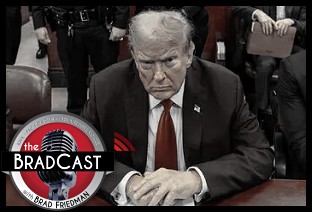 Trump, Republican Law(lessness) & (Dis)Order: 'BradCast' 10/21/25
Trump, Republican Law(lessness) & (Dis)Order: 'BradCast' 10/21/25 'Green News Report' 10/21/25
'Green News Report' 10/21/25 Celebrating 'No Kings': 'BradCast' 10/20/25
Celebrating 'No Kings': 'BradCast' 10/20/25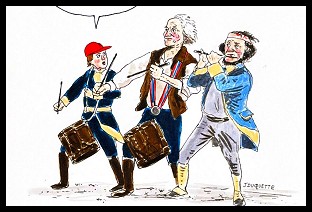 Sunday 'How It Started' Toons
Sunday 'How It Started' Toons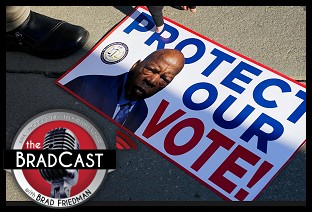 SCOTUS Repubs Appear Ready to Gut Rest of Voting Rights Act: 'BradCast' 10/16/25
SCOTUS Repubs Appear Ready to Gut Rest of Voting Rights Act: 'BradCast' 10/16/25 'Green News Report' 10/16/25
'Green News Report' 10/16/25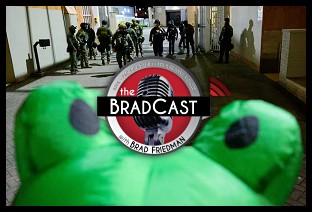 The 'Epstein Shutdown' and Other Autocratic Nightmares: 'BradCast' 10/15/25
The 'Epstein Shutdown' and Other Autocratic Nightmares: 'BradCast' 10/15/25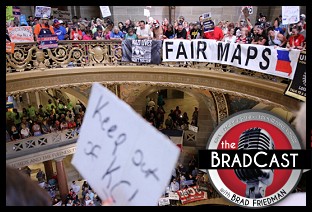 Group Vows to Block MO's GOP U.S. House Gerrymander: 'BradCast' 10/14/25
Group Vows to Block MO's GOP U.S. House Gerrymander: 'BradCast' 10/14/25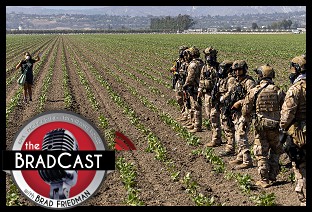 Trump Labor Dept. Warns Trump Policies Sparking Food Crisis: 'BradCast' 10/9/25
Trump Labor Dept. Warns Trump Policies Sparking Food Crisis: 'BradCast' 10/9/25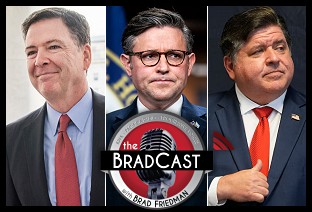 Trump's Losing Battles: 'BradCast' 10/8/25
Trump's Losing Battles: 'BradCast' 10/8/25 Trump, Roberts and His Stacked, Packed and Captured SCOTUS: 'BradCast' 10/7/25
Trump, Roberts and His Stacked, Packed and Captured SCOTUS: 'BradCast' 10/7/25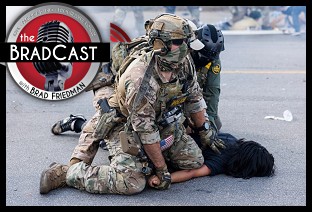 Trump Attempting His 'Invasion from Within': 'BradCast' 10/6/25
Trump Attempting His 'Invasion from Within': 'BradCast' 10/6/25 Biden Budget Expert: Mass Firings in Shutdown 'Illegal': 'BradCast' 10/2/25
Biden Budget Expert: Mass Firings in Shutdown 'Illegal': 'BradCast' 10/2/25 Why is DOJ Suing 'Blue' States for Their Voter Databases?: 'BradCast' 10/1/25
Why is DOJ Suing 'Blue' States for Their Voter Databases?: 'BradCast' 10/1/25
 VA GOP VOTER REG FRAUDSTER OFF HOOK
VA GOP VOTER REG FRAUDSTER OFF HOOK Criminal GOP Voter Registration Fraud Probe Expanding in VA
Criminal GOP Voter Registration Fraud Probe Expanding in VA DOJ PROBE SOUGHT AFTER VA ARREST
DOJ PROBE SOUGHT AFTER VA ARREST Arrest in VA: GOP Voter Reg Scandal Widens
Arrest in VA: GOP Voter Reg Scandal Widens ALL TOGETHER: ROVE, SPROUL, KOCHS, RNC
ALL TOGETHER: ROVE, SPROUL, KOCHS, RNC LATimes: RNC's 'Fired' Sproul Working for Repubs in 'as Many as 30 States'
LATimes: RNC's 'Fired' Sproul Working for Repubs in 'as Many as 30 States' 'Fired' Sproul Group 'Cloned', Still Working for Republicans in At Least 10 States
'Fired' Sproul Group 'Cloned', Still Working for Republicans in At Least 10 States FINALLY: FOX ON GOP REG FRAUD SCANDAL
FINALLY: FOX ON GOP REG FRAUD SCANDAL COLORADO FOLLOWS FLORIDA WITH GOP CRIMINAL INVESTIGATION
COLORADO FOLLOWS FLORIDA WITH GOP CRIMINAL INVESTIGATION CRIMINAL PROBE LAUNCHED INTO GOP VOTER REGISTRATION FRAUD SCANDAL IN FL
CRIMINAL PROBE LAUNCHED INTO GOP VOTER REGISTRATION FRAUD SCANDAL IN FL Brad Breaks PA Photo ID & GOP Registration Fraud Scandal News on Hartmann TV
Brad Breaks PA Photo ID & GOP Registration Fraud Scandal News on Hartmann TV  CAUGHT ON TAPE: COORDINATED NATIONWIDE GOP VOTER REG SCAM
CAUGHT ON TAPE: COORDINATED NATIONWIDE GOP VOTER REG SCAM CRIMINAL ELECTION FRAUD COMPLAINT FILED AGAINST GOP 'FRAUD' FIRM
CRIMINAL ELECTION FRAUD COMPLAINT FILED AGAINST GOP 'FRAUD' FIRM RICK SCOTT GETS ROLLED IN GOP REGISTRATION FRAUD SCANDAL
RICK SCOTT GETS ROLLED IN GOP REGISTRATION FRAUD SCANDAL VIDEO: Brad Breaks GOP Reg Fraud Scandal on Hartmann TV
VIDEO: Brad Breaks GOP Reg Fraud Scandal on Hartmann TV RNC FIRES NATIONAL VOTER REGISTRATION FIRM FOR FRAUD
RNC FIRES NATIONAL VOTER REGISTRATION FIRM FOR FRAUD EXCLUSIVE: Intvw w/ FL Official Who First Discovered GOP Reg Fraud
EXCLUSIVE: Intvw w/ FL Official Who First Discovered GOP Reg Fraud GOP REGISTRATION FRAUD FOUND IN FL
GOP REGISTRATION FRAUD FOUND IN FL

































